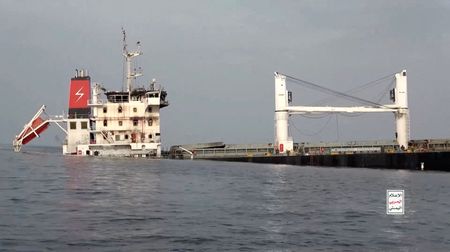By Lisa Baertlein
LOS ANGELES (Reuters) -Yemen's Houthis will target U.S. oil majors including ExxonMobil and Chevron with sanctions, a body affiliated with the Iran-backed militia said on Tuesday.
The Sanaa-based Humanitarian Operations Coordination Center (HOCC), a body set up last year to liaise between Houthi forces and commercial shipping operators, sanctioned 13 U.S. companies, nine executives and two vessels, HOCC said.
The sanctions are in retaliation for U.S. sanctions imposed on the Houthis this year despite a truce agreement with the Trump administration in which the Yemeni group agreed to stop attacking U.S.-linked ships in the Red Sea and the wider Gulf of Aden, HOCC said.
Exxon declined comment and Chevron did not immediately comment.
"It remains unclear whether these sanctions signal that the Houthis will begin targeting vessels linked to the sanctioned organizations, companies, and individuals — a move that would risk violating the ceasefire agreement with the Trump administration, facilitated by Oman," independent Middle East analyst Mohammed Albasha said in a LinkedIn post on Tuesday.
The Houthis since 2023 have launched numerous assaults on vessels in the Red Sea that they deem to be linked with Israel in what they say is solidarity with Palestinians over Israel's war on Gaza.
That campaign has had little effect on vital oil tanker traffic through the Strait of Hormuz, which is located between Oman and Iran and connects the Persian Gulf with the Gulf of Oman and the Arabian Sea, according to the U.S. Energy Information Administration.
The Houthis have occasionally attacked ships in the Gulf of Aden, which connects the Red Sea and the Arabian Sea.
The Houthis on Monday claimed responsibility for attacking a Dutch cargo ship in the Gulf of Aden with a cruise missile, injuring two crew and leaving the vessel ablaze and adrift.
Last year, the U.S. imported about 500,000 barrels per day of crude and condensate from Gulf countries through the Strait of Hormuz, according to the EIA. That represents about 7% of total U.S. crude oil and condensate imports - the lowest level in nearly 40 years due to increased domestic production and Canadian imports, the agency said.
Albasha, founder of U.S.-based Risk Advisory Basha Report, told Reuters the move is unlikely to affect the oil market, since most of the trade in the region is handled by Chinese, Russian, Iranian, and other Gulf companies that the Houthis want to keep on good terms with.
"This looks like a media stunt, a way to save face and reassure their people in light of mounting U.S. sanctions and Israeli strikes that have been hurting their economy," he said.
To that end, the HOCC statement also included this line: "The ultimate goal of the sanctions is not punishment in itself, but to bring about positive behavioral change."
(Reporting by Lisa Baertlein in Los Angeles, Liz Hampton in Denver and Sheila Dang in Houston; Editing by Daniel Wallis and Stephen Coates)







